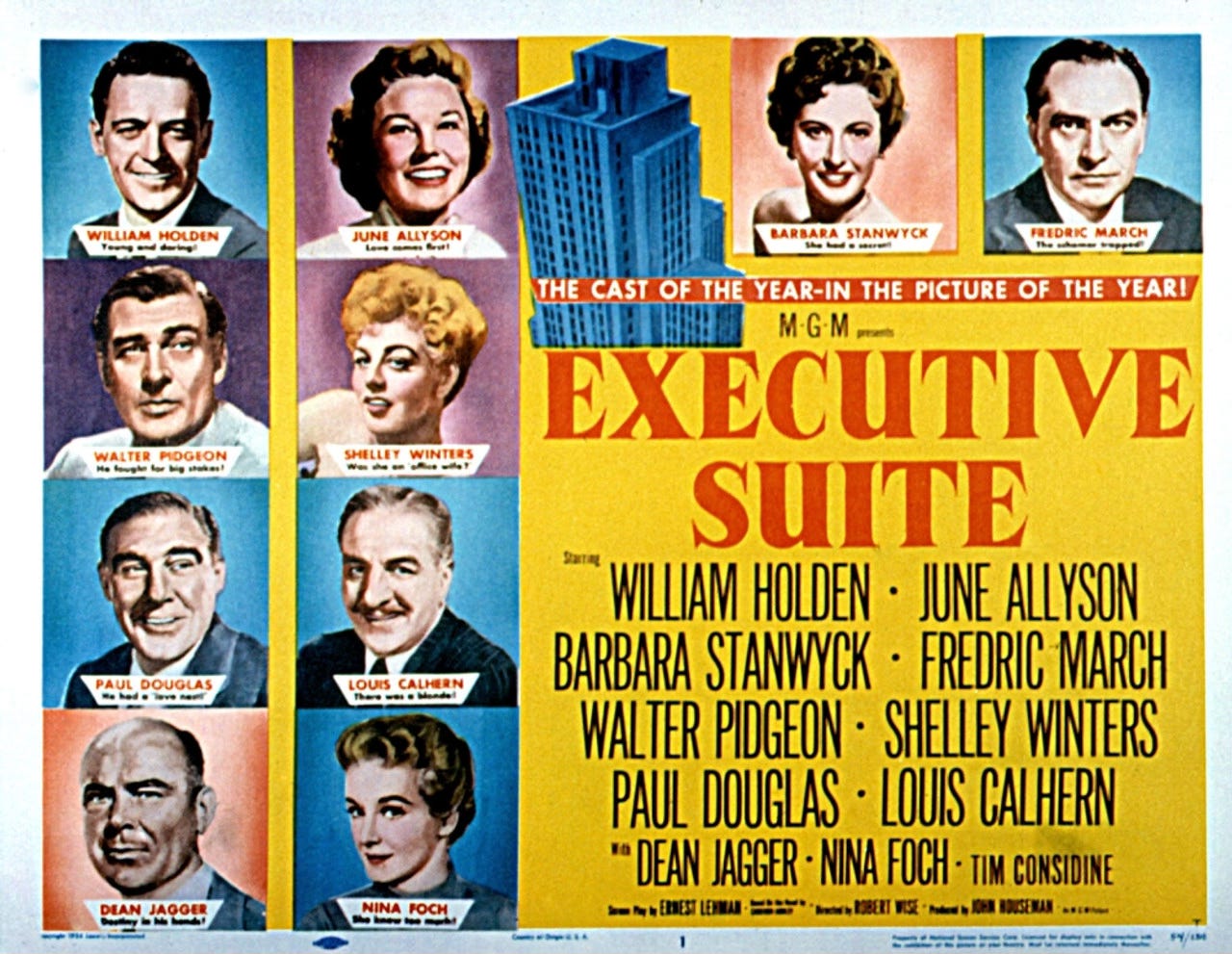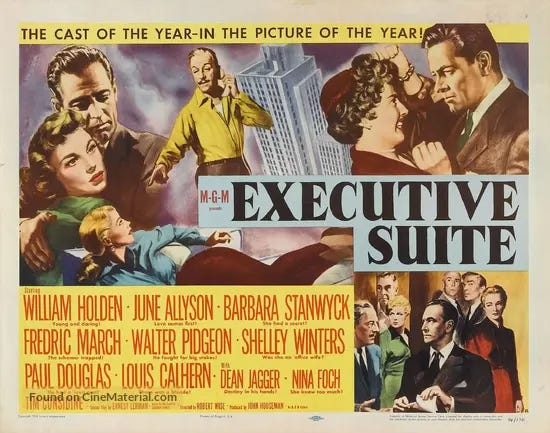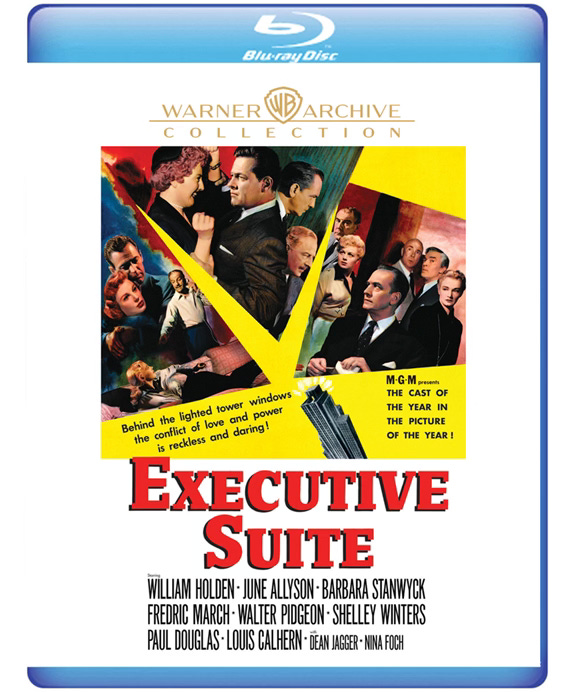'Executive Suite' Blu-ray Review: Loneliness and Sudden Death
William Holden, June Allyson, Fredric March, and Barbara Stanwyck star in director Robert Wise's high-powered dissection of office politics.
In the late 70s, I began working at an insurance company as a Payment Analyst Trainee.
Fresh out of high school, the title sounded quite good, and only required that the applicant be able to type and operate a calculator, two of the very few skills that I possessed. The prospect of college or any other type of higher education didn't appeal to me; I wanted to forge a career as a writer, and I thought the $600 monthly salary would help me.
Instead, I quickly grew bored with processing payments in the Group Insurance Department and wondered how the men (and a few women) were able to move up and get their own private office and tell people what to do all day. Or so I fantasized, which explains why I thought Billy Wilder's The Apartment (1960) was fantastically aspirational, if unlikely, since I was still living at home and didn't have an a apartment which my bosses could "borrow" for their extramarital assignations.
After I changed jobs and moved to New York, I saw Robert Wise's Executive Suite (1954), which instantly brought back memories of working at the insurance company in Los Angeles. It's a far different setup, naturally, but all the office politics felt familiar and sounded familiar in a strange sort of way, even though I never got close to the insurance company's executive suite during my three-year tenure. (I had some sort of a breakdown there near the end, where everything my boss said made me laugh and I was nearly fired before quitting.)
Scripted by the great Ernest Lehman early in his Hollywood career, adapting Cameron Hawley's novel, first published in 1952, Executive Suite begins with the first-person point of view of a businessman as he departs his office in New York City one Friday afternoon before dropping dead -- of a stroke! (which makes me glad I survived my stroke) -- on the street. His wallet is picked up by a stranger and tossed in the trash, so no one knows his identity.
Except, that is, for Louis Calhern as George Casswell, who just happens to be looking out the window at the moment that the anonymous man drops dead. It's a stroke of luck that Casswell recognizes the man as his own boss, Avery Bullard, the head of Tredway Corporation, a furniture manufacturer. Gambling that his boss is dead, Casswell quickly places an order to profit in the stock market from his unforeseen "tip," knowing the likelihood that no one else will benefit from his insider trading. All he has to do is wait until Monday morning, and then cash in.
(I've always loved Louis Calhern, who, sadly, died just two years later at the age of 61.)
The story moves to eastern Pennsylvania, where the Tredway Corporation and its furniture factory is headquartered. Before his death, Bullard called for a meeting of the board of directors, and so we are introduced to the gang of Vice Presidents: idealistic manufacturing man William Holden, numbers-obsessed finance guy Fredric March, gregarious salesman Paul Douglas, and the aforementioned slimy Louis Calhern, as well as the aging Walter Pidgeon and Dean Jagger. Because Bullard failed to name a successor, leadership of the company is up for grabs. Let the squabbling begin!
In addition to the men, we also see a few women: Bullard's efficient secretary Nina Foch, William Holden's loyal wife June Allyson, Paul Douglas' long-suffering mistress Shelley Winters, and the founder's daughter Barbara Stanwyck, who also had some kind of relationship with Avery Bullard and really wants nothing more to do with men, their toys, or the company, in which she is a major shareholder.
Because this was an MGM production in 1952, there is no diversity amongst the cast; it's nearly all white men in business suits, arguing and cajoling and disagreeing and sometimes getting high-faluting. Since I am 50% Caucasian, I had no problems with that aspect, since it represents how things were in 1952 America.
The women play to different expectations, and each fills a specific role assigned to women in 1952 America: Nina Foch -- nominated for an Academy Award for her performance -- as an uncomplaining underling who 'knows her place' as an uncomplaining underling; June Allyson as a dutiful and loyal housewife who must apologize when she does something that may hurt her husband's chances at ascension; Shelley Winters as an unhappy woman who nags her still-married lover; Barbara Stanwyck as a woman who clearly is suffering from mental health issues and clearly contemplates suicide.
Watching the men tussle, all without throwing a punch, is what fascinates me. Ernest Lehman's script is a model of efficiency and is filled with clever lines of dialogue, rising to a crescendo with William Holden's magnificent closing speech, suitable for any ambitious politician or commanding officer in the heat of battle. What's wonderful is that Holden builds his character organically throughout the movie, as he gradually comes to realize that he is best suited for the company's leadership position, and then, having convinced himself, must convince everyone else.
It's the kind of speech that is written for a movie star to deliver, and Holden sinks his teeth into the material and gives a sterling performance that only gets better every time I watch it. After my first viewing of the movie, sometime in the late 1980s on videotape, I've seen it several times since on Turner Classic Movies.
John Houseman produced the picture, which has no musical accompaniment. Newly released on Blu-ray as part of the Warner Archive Collection, the black and white photography by George Folsey, nominated for an Academy Award, looks great. With the higher definition, I was better able to appreciate the splendid production design by art directors Edward Carfagno and Cedric Gibbons -- both nominated for Academy Awards -- and the dresses designed by Helen Rose, also nominated for an Academy Award. I loved the awesome business suits, which look fantastic on the Blu-ray.
The new Blu-ray also carries over the the special features included on the DVD release in 2007; most notably a commentary by Oliver Stone, who says he saw the film as a young person, and acknowledges it as one of the influences on his own Wall Street; the other special features are a Tom and Jerry cartoon, Hic-Cup Pup, and a Pete Smith novelty, Do Someone a Favor, as well as the original theatrical trailer.
Something essential in the movie still speaks to me. Maybe you need to have worked in an office for years to understand its enduring appeal.




